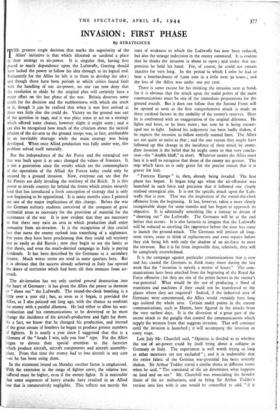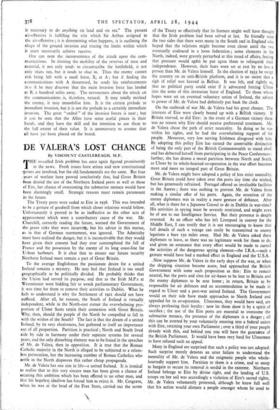INVASION : FIRST PHASE
By STRATEGICUS
THE greatest single decision that marks the superiority of the Allies' initiative is that which allocated so cardinal a place in their strategy to air-power. It is singular that, having first placed so much dependence upon the Luftwaffe, Goering should have lacked the power to follow his idea through, to its logical end. Fortunately for the Allies he left it to them to develop the idea ; and though there have been periods in which critics found fault with the handling of our air-power, no one can now deny that the resolution to abide by the original plan will certainly have a major effect on the last phase of the war. Britain deserves some credit for the decision and the stubbornness with which she stuck to it, though it can be realised that when it was first arrived at there was little else she could do. Victory on the ground was out of the question in 1940, and it was plain sense to act on a strategy which offered some chance, however slight it might seem ; and it can also be recognised how much of the criticism about the tactical relation of the air-arm to the ground troops was, in fact, attributable to an inevitable shortage while the main strategy was being developed. When once Allied production was fully under way, this problem solved itself naturally.
But the independence of the Air Force and the strategical use that was built upon it at once changed the values of frontiers. It is not a generation since the results which are the commonplaces of the operations of the Allied Air Forces today could only be secured by a ground invasion. Now, everyone can see that the :kir Forces are daily invading the territory of the Reich. It is this power to invade country far behind the fronts which armies securely hold that has introduced a fresh conception of strategy that is only now beginning to be appreciated. It is many months since I pointed out one of the major implications of this change. Before the war the German military students conceived of the conquest of great territorial areas as necessary for the provision of material for the sustenance of the war. It is now evident that they are necessary so that there may exist an area in which production shall enjoy immunity from air-invasion. It is the recognition of this crucial fact that turns the enemy outlook into something of a nightmare. For years they have been proclaiming that they could sell territory just as easily as did Russia ; now they begin to see the limits to that thesis, and even the much-decried campaign in Italy is paying dividends. It has been described by the Germans as a secondary theatre. Much worse terms are used in some quarters here. But it is obvious that the success already achieved in Italy has opened the doors of territories which had been till then immune from air- attack.
The air-invasion has not only carried general destruction into the heart of Germany: it has given the Allies the power to threaten to " shoot out" the Luftwaffe. The round-the-clock bombing is a little over a year old ; but, as soon as it began, it provided the Allies, as I also pointed out long ago, with the chance to confront she enemy with a painful dilemma. He had either to allow his war- production and his communications to be destroyed or he must change the incidence of his aircraft-production and fight for them. As a fact, we know that he changed his production, and instead of the great stream of bombers he began to produce greater numbers of fighters. It is nearly a year since I suggested that this is a dilemma of the "heads I win, tails you lose" type. For the Allies began to devote their special attention to the factories ,vhich produce aircraft, aircraft components and aircraft assembly- plant. From that time the enemy had to lose aircraft in any case —as he has been using them.
In the statement issued on Monday another factor is emphasised. With the extension in the range of fighter cover, the relative loss suffered must be higher, even if the enemy fights. It is noticeable that some sequences of heavy attacks have resulted in an Allied loss that is comparatively negligible. This reflects not merely the state of weakness to which the Luftwaffe has now been reduced, but also the strange indecision in the enemy command. It is evident that he thinks the invasion is about to open ; and under that im- pression he held his hand. For, of course, he could not remain inactive for very long. In the period to which I refer he had to bear a bombardment of 7,0o0 tons in a little over 3o hours ; and the loss of the Allies was under one per cent.
There is some excuse for his thinking the invasion near at hand, for it is obvious that the attack upon the nodal points of the main communications must be one of the immediate preparations for the ground assault. But it does not follow that the Second Front will be opened as soon as the first comprehensive attack is made on these cardinal factors in the mobility of the enemy's reset ves. Here he is confronted with an exaggeration of the original dilemma. He fights and loses, or he loses more ; but now he is being encour- aged not to fight. Indeed his judgement has been badly shaken, if he expects the invasion to follow entirely normal lines. The Allies are not quite so naive as that ; and the one reason they might have followed up this change in the incidence of their attack by imme- diate invasion is the belief that he might come to that very conclu- sion—the "double bluff," in short. Whatever strains the Allies must face it is well to recognise that those of the enemy are greater. The step which faces us is only grave for the precise reason that it is graver for him.
" Fortress Europe" is,- then, already being invaded. The first phase has begun. It began long ago when the air-offensive was launched in such force and precision that it followed one clearly realised strategical aim. It is not the specific attack upon the Luft- waffe that is new. That was the inspiration of the round-the-clock offensive from the beginning. It has, however, taken a more clearly recognisable shape for some months and has begun to approach its objective. It is admittedly something like a fantasy to dream of " shooting out" the Luftwaffe. The Germans will be at the end before that occurs. It is also fantastic to imagine that the Luftwaffe will be reduced to anything like impotence before the time has come to launch the ground-attack. The Germans will jettison all long- term views, cease to think of replacements and even repairs before they risk being left with only the shadow of an air-force to meet the invasion. But it is far from impossible that, relatively, they will be completely overwhelmed.
It is the campaign against particular communications that is new and has caused the Germans to think many times during the last week that the " invasion is merely a matter of hours." The com- munications have been attacked from the beginning of the Royal Air Force offensive ; for they are one of the prime factors in the enemy's war-potential. What would be the use of producing a flood of munitions and machines if they could not be transferred to the places where they are required? Indeed, if the industrial area of Germany were concentrated, the Allies would certainly have long ago isolated the whole area. Certain nodal points in the enemy communications, such as Hamm, have figured in the attacks from the very earliest days. It is the diversion of a great part of the recent attack to the ganglia that control the communications which supply the western front that suggests invasion. That will continue until the invasion is launched ; it will accompany the invasion in every stage.
Last July Mr. Churchill said, "Opinion is divided as to whether the use of air-power could by itself bring about a collapse in Germany or Italy. The experiment is well worth trying so long as other measures are not excluded"; and it is undeniable that the entire fabric of the German war-potential has been severely shaken. Sir Arthur Tedder stated a similar thesis in different terms when he said, " The command of the air determines what happens on land and on sea." Mr. Churchill was enunciating the broader thesis of the air enthusiasts, and to bring Sir Arthur Tedder's version into line with it one would be compelled to add. " if it is necessary to do anything on land and on sea." The present air-offensive is fulfilling the role which Sir Arthur assigned to the air-offensive ; it is determining what happens, it is outlining the shape of the ground invasion and tracing the limits within which it must necessarily achieve success.
One can note the inconvenience of the attack upon the com- munications. In limiting the mobility of the reserves of men and material, it not only tends to circumscribe the battlefield, it not only shuts out, but it tends to shut in. Thus the enemy cannot risk being left with a small force, X, at A ; but if finding the communications with A threatened, he sends his reinforcements into A he may discover that the main invasion force has landed at B, a hundred miles away. The nervousness about the attack on the communications is, therefore, natural. It may totally mislead the enemy, it may immobilise him. It is the certain prelude to immediate invasion, but it is not the prelude to a certainly immediate invasion. The great "ordeal" of the invasion forces is near ; but it can be seen that the Allies have some useful pieces in their hands, and they have the skill and the intention to use them to the full extent of their value. It is unnecessary to assume that all have yet been placed on the board.



























 Previous page
Previous page